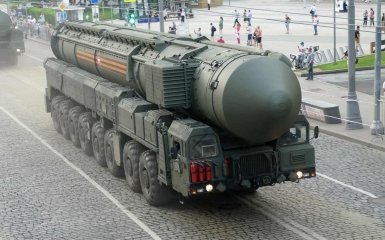The Kremlin is changing its nuclear rhetoric. Putin's spokesman Dmytro Peskov said that Russia will not use nuclear weapons in response to drone attacks on Russian territory.
Points of attention
- The Kremlin has declared that Russia will not resort to nuclear weapons in response to drone attacks, signaling a significant shift in its nuclear rhetoric.
- Russia's attempt to distance itself from inadequate nuclear threats reflects a strategic move to maintain a 'peace-making' image despite aggressive behavior.
- The unification of Western countries against potential nuclear threats plays a crucial role in maintaining geopolitical balance and deterring aggressive actions from Russia.
- Putin's updated doctrine of nuclear deterrence highlights the expanding categories of states subject to nuclear deterrence and the specific military threats that could trigger a nuclear response.
- The change in Russia's nuclear rhetoric indicates a shift towards seeking peaceful negotiations rather than relying solely on aggressive nuclear threats to assert dominance.
Putin talked about changing nuclear rhetoric
Peskov urged "not to appeal excessively to the new nuclear doctrine" and not to connect it with the so-called "SVO".
The Center for Countering Disinformation at the NSDC explains that this interpretation of Putin's "red lines" is presented in the Russian media as an attempt to "cool down hot nuclear heads."
It is characteristic that this statement was made against the background of the "nuclear ecstasy" of top Russian propagandists, who went far beyond common sense in their threats to Western countries.
Peskov's current statement is an attempt by the Kremlin to distance itself from inadequate nuclear threats. This is how Russia is trying not to destroy the last shreds of the "peace-making" image of Putin, who has repeatedly spoken about his alleged "readiness for negotiations."
The change in nuclear rhetoric is yet another proof that Moscow is bluffing. The Kremlin understands that threats do not have the expected effect on the Western community. Instead of fear, the West only reinforces its understanding that the Russian Federation is a nuclear terrorist that must be stopped.
Putin again began to scare the world with nuclear weapons
On September 25, the illegitimate president of Russia, Vladimir Putin, made changes to the Russian doctrine of nuclear deterrence. The Russian dictator announced this at a meeting of the Security Council of the Russian Federation.
The leader of the aggressor country drew the attention of those present at the Security Council that "in the updated version of the document, aggression against Russia by any non-nuclear state, but with the participation or support of a nuclear state, is proposed to be considered as their joint attack on the Russian Federation."
Putin expanded the "category of states and military alliances that are subject to nuclear deterrence." The document also added a list of "military threats for the neutralization of which nuclear deterrence measures are being implemented."
According to the Russian dictator, a nuclear response will occur in the event of "verified information about the launch of air-space attack means towards Russia." These are "strategic and tactical aircraft, cruise missiles, drones, hypersonic and other aircraft."
Also, the illegitimate president of the aggressor country stated that he would respond with a nuclear weapon if someone attacked Belarus.




